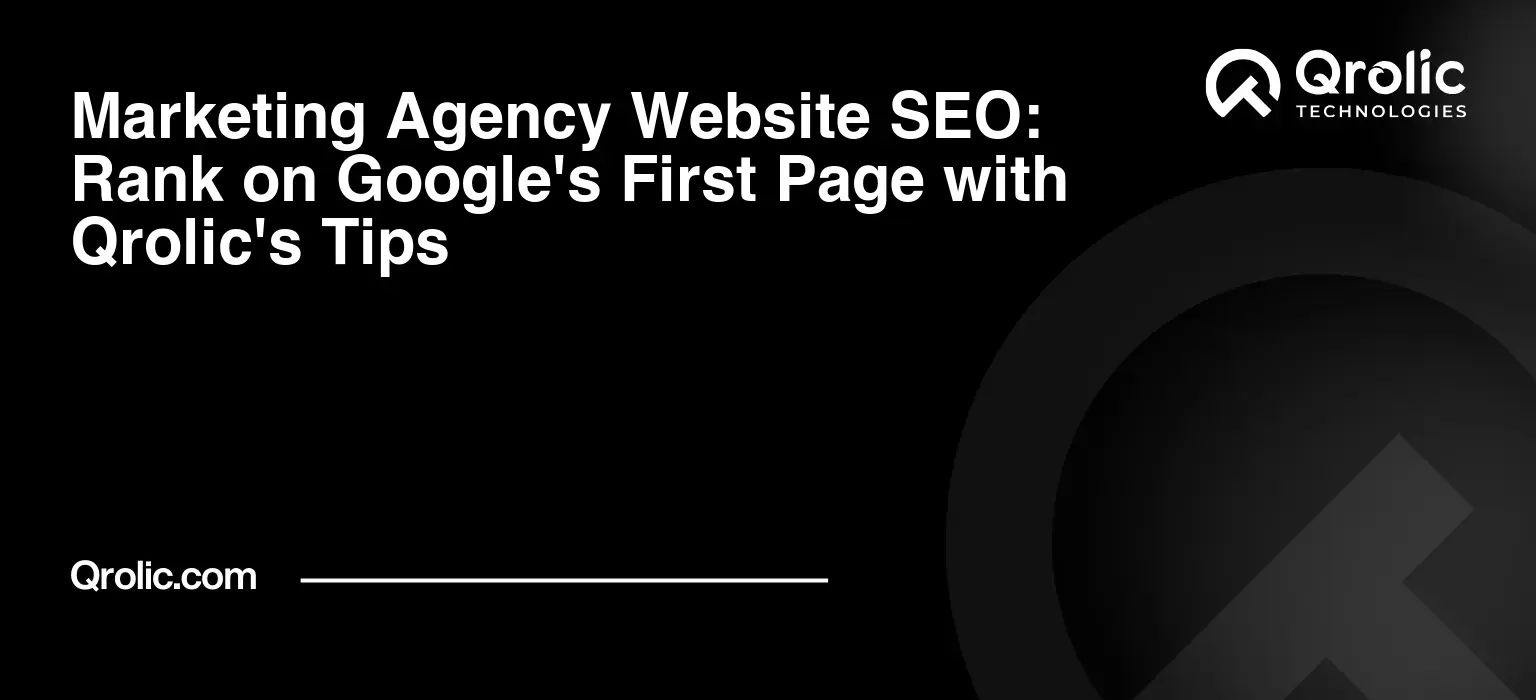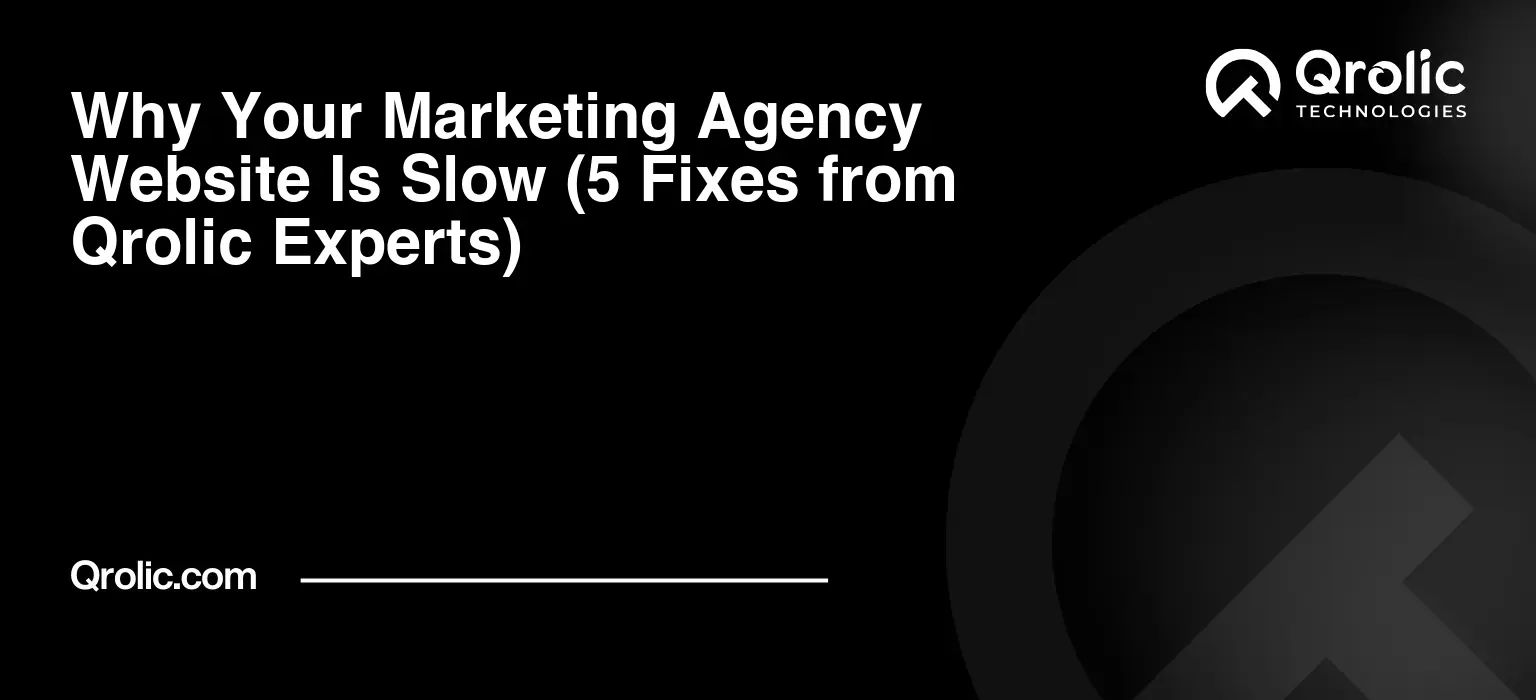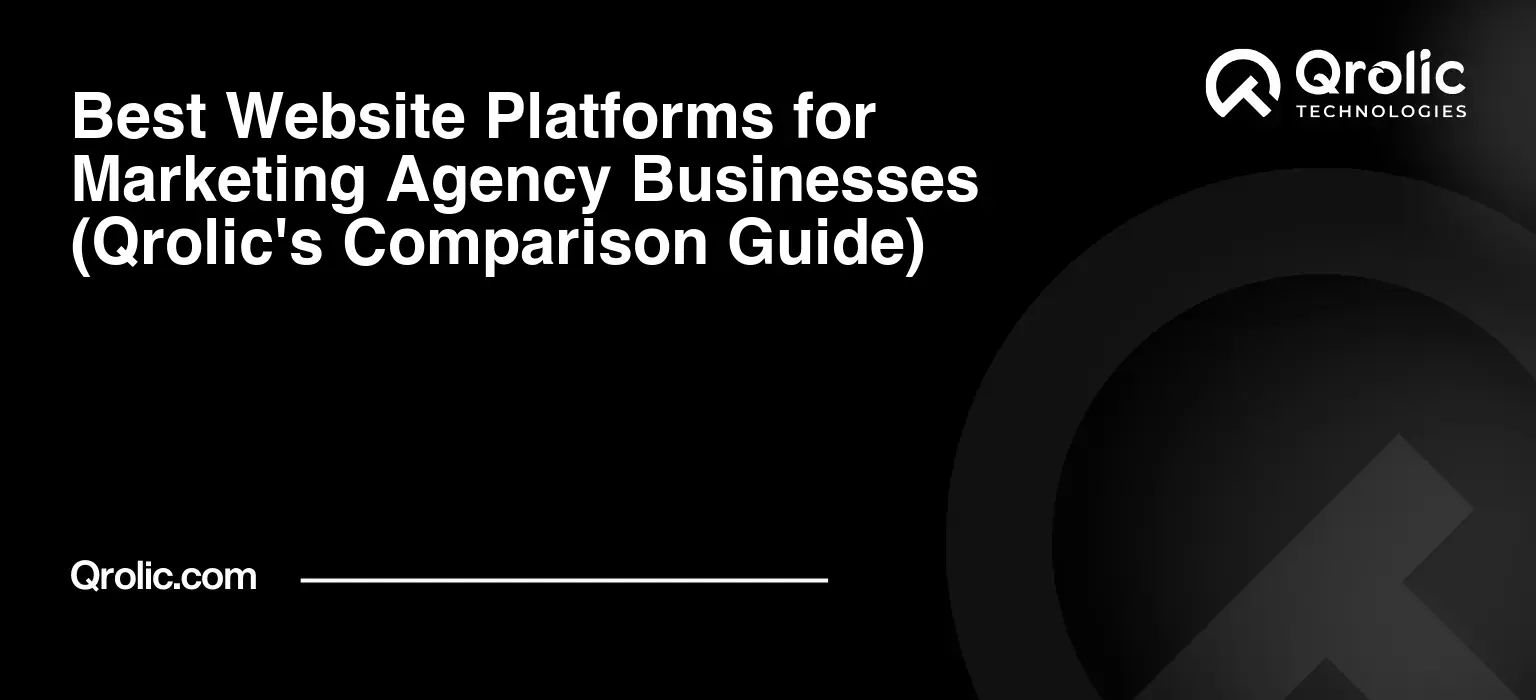Quick Summary:
- Your agency website is a vital growth investment.
- Costs depend on design, features, and content.
- Budget for both initial build and ongoing maintenance.
- A great website drives leads and builds brand trust.
Table of Contents
- The Unseen Powerhouse: Why Your Marketing Agency Website Isn’t Just a Digital Brochure
- Decoding the Dollars: Core Components Influencing Marketing Agency Website Cost
- Design Complexity & UI/UX
- Functionality & Features
- Content Creation & Optimization
- Technology Stack & Platform
- Ongoing Maintenance & Support
- The Numbers Game: How Much Does a Marketing Agency Website Really Cost in 2026?
- Entry-Level / Budget-Friendly Websites (Under ,000 – ,000)
- Mid-Range / Professional Websites (,000 – ,000)
- Premium / Enterprise-Level Websites (,000 – 0,000+)
- The Hidden Costs: Don’t Forget These!
- When to Invest: Timing Your Marketing Agency Website Development
- The ROI Factor: Why a High-Quality Website Pays for Itself (and More!)
- Increased Lead Generation
- Higher Conversion Rates
- Improved Brand Perception and Authority
- Talent Attraction and Retention
- Operational Efficiency
- Calculating Your Website’s ROI
- Crafting Your Budget: A Step-by-Step Guide for Marketing Agencies
- 1. Define Your Goals & Scope: What Do You Want Your Website to Do?
- 2. Research & Prioritize Features: Must-Haves vs. Nice-to-Haves
- 3. Consider Your Audience: What Do They Need/Expect?
- 4. Get Multiple Quotes: Compare Apples to Apples
- 5. Allocate for Ongoing Costs: Maintenance, Content, Marketing
- 6. Think Scalability: Can It Grow With You?
- Choosing Your Web Development Partner: More Than Just a Price Tag
- Qrolic Technologies: Your Partner in Building a High-Impact Marketing Agency Website
- Future-Proofing Your Investment: Trends for Marketing Agency Websites in 2026
- 1. AI Integration and Personalization
- 2. Voice Search Optimization
- 3. Core Web Vitals & Hyper-Performance
- 4. Interactive Content and Engagement
- 5. Prioritizing Accessibility (WCAG Compliance)
- 6. Headless CMS Advantages
- 7. Sustainable Web Design
- The Final Verdict: Your Marketing Agency Website is an Investment, Not an Expense
The Unseen Powerhouse: Why Your Marketing Agency Website Isn’t Just a Digital Brochure
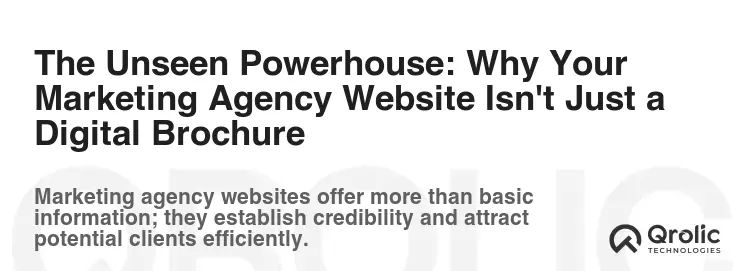
Your marketing agency’s website isn’t merely an online placeholder; it’s the digital heartbeat of your operation, a silent salesperson working 24/7, and the most powerful tool in your lead generation arsenal. In 2026, as the digital landscape continues its relentless evolution, the significance of a meticulously crafted, high-performing website for a marketing agency has never been more profound. It’s not just about having a website; it’s about owning a digital experience that captivates, converts, and commands respect.
Imagine your website as the grand reception area of your agency. Does it feel dated, cluttered, or difficult to navigate? Or does it exude professionalism, innovation, and a clear understanding of your clients’ needs? For a marketing agency, your website is the ultimate demonstration of your own capabilities. It’s where potential clients first encounter your brand, gauge your expertise, and decide if you’re the right partner to entrust with their marketing budget. A sub-par site for an agency that sells marketing is an immediate red flag, a glaring contradiction that erodes trust before a single conversation even begins.
This digital storefront serves multiple critical functions. It’s your global portfolio, showcasing your most impactful case studies and client successes. It’s your lead magnet, intelligently capturing contact information and nurturing prospects through automated funnels. It’s your educational hub, providing valuable insights through blogs and resources that establish your authority. Most importantly, it’s a trust builder. A polished, secure, and user-friendly website signals professionalism, reliability, and a deep understanding of current digital trends – all qualities potential clients seek in a marketing partner.
The cost of not investing in a stellar website far outweighs the initial financial outlay. Missed opportunities, lost leads, damaged credibility, and a constant struggle to stand out in a crowded market are the silent penalties. In 2026, the question isn’t whether you need a website, but rather, how sophisticated, user-centric, and results-driven your marketing agency website cost will be to truly reflect and propel your business forward. It’s the foundation upon which your entire digital marketing strategy rests, and compromise here can undermine every other effort.
Decoding the Dollars: Core Components Influencing Marketing Agency Website Cost
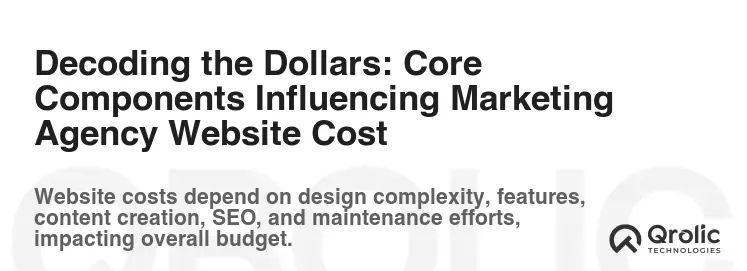
Understanding the marketing agency website cost involves breaking down the project into its fundamental components. Just like building a house, the final price tag depends on the materials, design complexity, features, and the expertise of the builders. Here’s what primarily drives the investment:
Design Complexity & UI/UX
The visual appeal and intuitive experience of your website are paramount. This is where the artistry meets the psychology of user behavior.
- Template-Based Design: This is often the most budget-friendly option. Utilizing pre-designed themes or templates (e.g., from wordpress, Squarespace, or Webflow) means less custom coding and faster deployment. While cost-effective, it offers limited uniqueness and flexibility. You might pay anywhere from a few hundred to a few thousand dollars for a premium template and basic customization.
- Semi-Custom Design: This approach starts with a robust template but involves significant customization to align with your brand identity, integrate unique elements, and optimize specific user journeys. This offers a good balance between cost and uniqueness, providing a distinct look without the full expense of a completely custom build.
- Custom Design: This is the premium tier, involving designers creating a unique layout, branding elements, and user interface (UI) from scratch. Every pixel is tailored to your agency’s brand, target audience, and specific goals. This ensures unparalleled uniqueness, optimal user experience (UX), and maximum flexibility for future scaling. The investment here is significantly higher due to the intensive design and development hours involved.
- Responsive Design: Non-negotiable in 2026, this ensures your website looks and functions perfectly on desktops, tablets, and mobile devices. While standard for any reputable developer, ensuring flawless responsiveness across countless devices adds to the testing and optimization phase.
- Brand Alignment: How well the design reflects your agency’s brand values, personality, and aesthetic plays a crucial role. A design that resonates deeply with your target audience requires strategic planning and iterative refinement, impacting the design hours.
Functionality & Features
The capabilities embedded within your website directly correlate with the marketing agency website cost. More sophisticated features demand more development time and expertise.
- Basic Informational Pages: Home, About Us, Services, Contact. These are foundational and relatively straightforward.
- Portfolio & Case Study Management: Crucial for agencies. This involves dynamic sections to display your work, often with filtering options, detailed project descriptions, and client testimonials. The ability to easily update and add new case studies is key.
- Blog/Content Management System (CMS): A robust blog is vital for SEO and thought leadership. A user-friendly CMS (like WordPress, Webflow, or a headless CMS) allows your team to publish and manage content without developer intervention.
- Lead Generation Forms: Contact forms, quote request forms, newsletter sign-ups, and gated content forms (e.g., for downloading whitepapers). These require secure submission, auto-responses, and often integration with CRM systems.
- CRM Integration: Connecting your website forms directly to your Customer Relationship Management (CRM) system (e.g., HubSpot, Salesforce, Zoho CRM) streamlines lead nurturing and sales processes, saving significant manual effort.
- Analytics Integration: Setting up Google Analytics 4, Google Tag Manager, and other tracking tools to monitor website performance, user behavior, and conversion metrics is essential. This often involves custom event tracking.
- Live Chat/Chatbot Integration: Providing instant support and lead capture through automated or live chat systems enhances user experience and conversion rates.
- Booking/Scheduling System: If your agency offers initial consultations or discovery calls, integrating a calendar booking system (e.g., Calendly) simplifies the scheduling process for potential clients.
- Client Portal: A secure, password-protected area where clients can access project updates, reports, shared documents, or communicate with their account managers. This adds significant value and complexity.
- SEO Tools & Structure: Implementing technical SEO best practices from the ground up, including proper URL structures, schema markup, sitemaps, and robots.txt files, is crucial for search engine visibility.
- Multilingual Support: For agencies targeting international clients, implementing translation capabilities or separate language versions of the site adds considerable complexity.
Content Creation & Optimization
A beautiful website with no compelling content is like an empty art gallery. High-quality content drives engagement, SEO, and conversions.
- Website Copywriting: Crafting persuasive, SEO-friendly, and brand-aligned text for every page of your site. This requires skilled copywriters who understand your agency’s unique value proposition and target audience.
- Photography & Videography: Professional photos of your team, office, and potentially client testimonials or explainer videos significantly enhance credibility and engagement. Stock photos might save money but lack authenticity.
- Case Study Development: Translating client successes into compelling narratives that showcase your agency’s impact. This often involves interviewing clients, data visualization, and professional writing.
- SEO Content Optimization: Ensuring all content is optimized with relevant keywords, proper heading structures, internal links, and calls to action to maximize search engine visibility and user engagement.
Technology Stack & Platform
The underlying technology choice heavily influences development costs, scalability, and ongoing maintenance.
- Content Management Systems (CMS):
- WordPress: Very popular, flexible, and has a vast ecosystem of plugins. Development costs can vary widely depending on customization. Often chosen for its balance of cost and power.
- Webflow: Excellent for visual design and development without heavy coding, offering great design freedom and performance. Can be more expensive than basic WordPress.
- Headless CMS (e.g., Contentful, Strapi, Sanity): Separates the content backend from the frontend, offering extreme flexibility, scalability, and performance. Ideal for complex sites and those needing multi-platform delivery, but typically incurs higher development costs.
- Custom-Built: Developed from scratch using frameworks like React, Angular, Vue.js, or native PHP/Python. Offers ultimate flexibility and performance but is the most expensive and time-consuming option.
- Hosting:
- Shared Hosting: Most affordable, but less reliable and slower. Not ideal for growing agencies.
- VPS (Virtual Private Server): More power and control, better performance. Mid-range cost.
- Dedicated Server/Cloud Hosting (AWS, Google Cloud, Azure): Highest performance, scalability, and security. Essential for high-traffic, complex sites, but also the most expensive.
- Security:
- SSL Certificate: Essential for encryption and trust. Often included with hosting but premium options exist.
- Firewalls & Malware Protection: Implementing robust security measures to protect against cyber threats.
- Regular Backups: Automated and manual backup solutions to prevent data loss.
- Security Audits: Periodic checks for vulnerabilities, especially for high-value sites.
Ongoing Maintenance & Support
A website is never truly “finished.” It requires continuous care to remain effective and secure.
- Software Updates: Keeping the CMS, themes, and plugins updated to prevent security vulnerabilities and ensure compatibility.
- Bug Fixes: Addressing any technical issues that arise post-launch.
- Security Monitoring: Constant vigilance against potential threats and attacks.
- Content Updates: Regularly refreshing information, adding new blog posts, case studies, and service offerings.
- Performance Optimization: Ongoing efforts to improve site speed, mobile responsiveness, and overall user experience.
- Technical Support: Access to developers for troubleshooting and assistance.
- Scalability Planning: Ensuring the website architecture can support future growth in traffic, features, and content without requiring a complete rebuild.
Each of these components contributes significantly to the overall marketing agency website cost, allowing for a wide spectrum of investment depending on your agency’s specific needs, ambition, and budget.
The Numbers Game: How Much Does a Marketing Agency Website Really Cost in 2026?
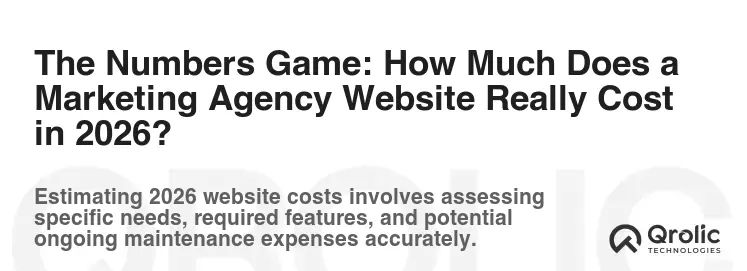
Let’s talk real figures. The marketing agency website cost is not a fixed price; it’s a spectrum. In 2026, you can broadly categorize these investments into three tiers, each offering different levels of sophistication and impact. These figures represent a full project cost, including design, development, content integration, and basic SEO setup, but exclude long-term ongoing marketing efforts.
Entry-Level / Budget-Friendly Websites (Under $5,000 – $15,000)
This tier is ideal for startups, solo agencies, or those with very limited budgets who need a professional online presence quickly.
- Who it’s for: New agencies, freelance marketers, small local marketing consultants.
- Features to Expect:
- Template-Based Design: Often built on popular CMS platforms like WordPress or Squarespace using a premium theme with minimal customization.
- Essential Pages: Home, About Us, Services (1-3 key services), Portfolio (showcasing 3-5 examples), Contact Us.
- Basic Functionality: Contact form, social media integration, responsive design.
- Limited Content: Client-provided text and images, or very basic copywriting services.
- Basic SEO Setup: Installation of an SEO plugin (e.g., Yoast SEO), simple meta descriptions, and title tags.
- Pros: Quick to launch, lowest initial investment, provides a professional baseline.
- Cons: Limited uniqueness, less flexible for future scaling, might not fully reflect complex brand identities, potential for slower performance if not optimized carefully.
- What you get: A functional, presentable website that acts as a digital business card and a basic lead capture tool. It’s a starting point, but may lack the competitive edge required for rapid growth.
Mid-Range / Professional Websites ($15,000 – $40,000)
This tier is suitable for growing agencies with established client bases and a clear vision for their brand, aiming for a distinctive online presence.
- Who it’s for: Small to mid-sized marketing agencies, those looking to rebrand or upgrade from an entry-level site, agencies with specific lead generation goals.
- Features to Expect:
- Semi-Custom or Highly Customized Template Design: Starting with a high-quality theme but significantly altering layouts, adding custom sections, and deeply integrating brand elements for a unique look and feel.
- Comprehensive Pages: Detailed service pages (with sub-services), robust About Us with team bios, extensive portfolio/case study section (10+ projects with filtering), blog, dedicated Careers page, FAQs, privacy policy, and terms.
- Enhanced Functionality: CRM integration for lead capture, advanced contact forms, basic analytics setup (Google Analytics 4), live chat integration, potentially a basic client login area or resource hub.
- Professional Content: Custom copywriting for core pages, some professional photography/videography, and a content plan for initial blog posts.
- Strong SEO Foundation: In-depth keyword research, optimized content structure, robust technical SEO implementation, faster loading speeds.
- Pros: Distinctive brand representation, improved user experience, better lead conversion capabilities, more scalable than entry-level, stronger SEO performance.
- Cons: Requires a more significant upfront investment, longer development time than basic sites.
- What you get: A powerful marketing asset that genuinely reflects your agency’s expertise, engages visitors effectively, and contributes significantly to lead generation and brand authority.
Premium / Enterprise-Level Websites ($40,000 – $100,000+)
This tier is for large, established marketing agencies, those with highly complex requirements, unique brand positioning, or aggressive growth strategies.
- Who it’s for: Large marketing firms, agencies with multiple specializations, those targeting enterprise clients, agencies needing cutting-edge technology and bespoke features.
- Features to Expect:
- Fully Custom Design & Development: Every element designed and coded from scratch, ensuring unparalleled uniqueness, optimal performance, and future-proof scalability. Often utilizing advanced frameworks or headless CMS architectures.
- Extensive Pages & Content: Highly interactive home page, deep-dive service pages, dynamic case studies with rich media, thought leadership hubs, resource libraries, detailed team and culture sections, multi-language support.
- Advanced Functionality: Bespoke CRM integrations, custom client portals with dashboards, advanced reporting features, marketing automation integration, sophisticated interactive elements (calculators, quizzes), AI-powered chatbots, personalized user experiences, robust security protocols, internal project management integrations.
- Comprehensive Content Strategy: Professional copywriting across the entire site, high-quality bespoke photography and videography, interactive content creation, ongoing content planning, and SEO strategy.
- Aggressive SEO & Performance: Advanced technical SEO, schema markup implementation, lightning-fast loading speeds, continuous performance monitoring, and optimization.
- Pros: Ultimate flexibility, unparalleled branding, cutting-edge technology, superior user experience, maximum conversion potential, highest competitive advantage, built for extreme scalability and future trends.
- Cons: Highest investment, longest development cycles, requires detailed planning and ongoing maintenance.
- What you get: A state-of-the-art digital flagship that not only captures leads but also embodies your agency’s innovation, thought leadership, and ability to deliver exceptional results. It’s a strategic investment designed to drive significant business growth and market dominance.
The Hidden Costs: Don’t Forget These!
Beyond the initial development, there are crucial recurring costs that impact the overall marketing agency website cost over its lifespan:
- Domain Registration: (~$15-$50 per year) Your website address.
- Hosting Fees: (From $10/month for shared to $300+/month for dedicated/cloud) Essential for your site to be online.
- Premium Themes/Plugins/Software Licenses: (Varies, often $50-$500+ per year) For specific functionalities or enhanced design.
- SSL Certificates (if not included with hosting): (~$50-$200 per year for advanced options).
- Ongoing Maintenance & Security: (Often a retainer, $100-$1000+ per month depending on complexity) Updates, backups, bug fixes, security monitoring.
- Content Creation: (Ongoing, highly variable) Blog posts, new case studies, videos to keep your site fresh and SEO-friendly.
- Marketing Efforts Post-Launch: (Varies greatly) PPC, social media campaigns, email marketing to drive traffic to your new site.
- Website Redesigns/Refreshes: (Every 3-5 years, potentially another significant investment) To keep your site modern and aligned with evolving trends.
Factoring in these ongoing expenses is crucial for a realistic marketing agency website cost budget plan.
When to Invest: Timing Your Marketing Agency Website Development
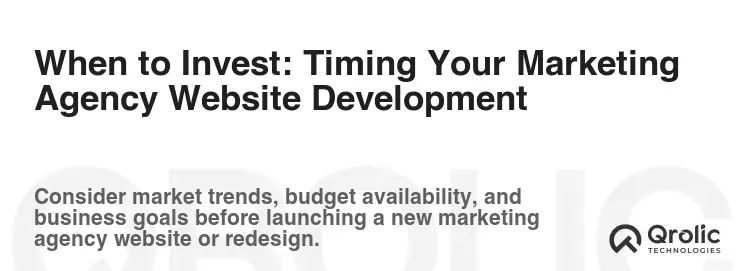
The decision of when to invest in a new or upgraded marketing agency website is as strategic as the investment itself. It’s rarely a static choice, but rather a dynamic response to your agency’s growth, challenges, and aspirations. Understanding these triggers can help you allocate your marketing agency website cost effectively.
- Starting Up a New Agency: This is the most obvious “when.” From day one, you need a digital presence to establish credibility, showcase services, and capture initial leads. Even a budget-friendly site is essential. Without it, you lack a central hub for all your marketing efforts.
- Rebranding or Pivoting Services: If your agency is undergoing a significant rebrand, changing its core services, or targeting a new niche, your website must reflect this evolution. An outdated site sends mixed messages and undermines your new direction. This is a prime time for a substantial marketing agency website cost investment to align your digital identity with your refreshed brand.
- Scaling and Growth: When your agency is experiencing rapid growth, acquiring larger clients, or expanding into new markets, your current website might become a bottleneck. It might lack the scalability, advanced features, or sophisticated design necessary to support higher traffic volumes, complex client requirements, or a more diverse service offering. An upgrade is critical to sustain momentum.
- Underperforming Current Website: If your website isn’t generating leads, has high bounce rates, slow loading times, poor mobile responsiveness, or consistently ranks poorly in search results, it’s a clear signal that it’s time for an overhaul. A website that isn’t performing its primary function is costing you more in lost business than any development fee.
- Outdated Design and Technology: The digital world moves fast. A website built even 3-5 years ago can look and feel dated, impacting user trust and perception. If your site doesn’t reflect modern design trends, secure best practices, or cutting-edge technology, it’s time to invest in a refresh. This isn’t just aesthetic; it affects SEO and user experience.
- Competitors Have Superior Websites: In a competitive industry like marketing, observing your rivals’ online presence is crucial. If your competitors boast more engaging, feature-rich, or visually stunning websites, you’re at a disadvantage. Keeping pace, or ideally, surpassing them, necessitates a strategic investment.
- New Service Offerings or Products: Introducing new services or specialized offerings requires dedicated sections on your website to explain their value, showcase relevant case studies, and integrate lead capture mechanisms specific to those offerings. Sometimes this can be done as an add-on, but if the new offerings fundamentally change your agency’s profile, a broader website update may be warranted.
- Attracting Top Talent: Your website isn’t just for clients; it’s also a powerful recruiting tool. Top talent in the marketing industry seeks agencies that are innovative, professional, and practice what they preach. A sophisticated, well-designed website can be a significant draw for potential employees.
Ultimately, the best time to invest in your marketing agency’s website is when you recognize that your current online presence is either hindering your growth, failing to represent your true capabilities, or preventing you from achieving your strategic business objectives. Viewing the marketing agency website cost through the lens of growth and opportunity, rather than just an expense, is key to making timely and impactful decisions.
The ROI Factor: Why a High-Quality Website Pays for Itself (and More!)
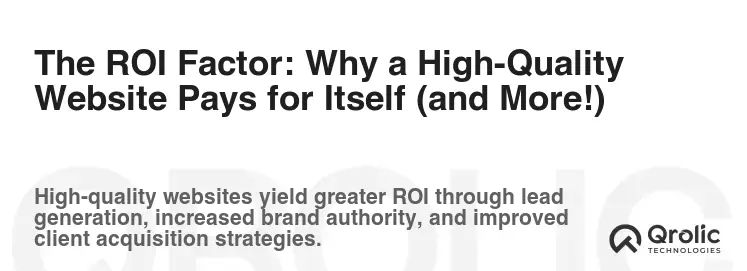
When considering the marketing agency website cost, it’s natural to focus on the expenditure. However, a truly exceptional website for a marketing agency should be viewed as a strategic investment with a measurable return on investment (ROI). It’s not just about having a pretty face; it’s about building a powerful engine that drives revenue and builds long-term value.
Increased Lead Generation
This is arguably the most direct and impactful ROI. A well-designed, SEO-optimized website acts as a 24/7 lead magnet.
- Organic Traffic: High search engine rankings for relevant keywords (e.g., “digital marketing agency New York,” “SEO services for e-commerce”) bring in qualified prospects who are actively searching for your services.
- Conversion Optimization: Clear calls-to-action, compelling forms, and user-friendly navigation guide visitors towards becoming leads, whether through contact forms, whitepaper downloads, or consultation bookings.
- Content Marketing: A robust blog and resource section positions your agency as a thought leader, attracting inbound leads who value your expertise.
Higher Conversion Rates
Beyond simply attracting leads, a high-quality website converts a higher percentage of visitors into paying clients.
- Credibility & Trust: A professional, modern website instantly builds trust. It showcases your expertise, client testimonials, and case studies in a compelling way, making prospects more confident in your abilities.
- Enhanced User Experience (UX): A fast, intuitive, and mobile-responsive website reduces frustration and keeps visitors engaged, increasing the likelihood they will explore your services and convert.
- Clear Value Proposition: A well-structured site articulates your unique selling points and the benefits of working with your agency, directly addressing potential clients’ pain points.
Improved Brand Perception and Authority
Your website is a powerful tool for shaping how your brand is perceived in the marketplace.
- Professional Image: It communicates sophistication, attention to detail, and a commitment to quality – qualities clients seek in a marketing partner.
- Thought Leadership: A strong content strategy supported by an excellent website establishes your agency as an industry expert, attracting not only clients but also potential strategic partners and top talent.
- Competitive Advantage: In a crowded market, a superior website can be the distinguishing factor that makes your agency stand out from the competition.
Talent Attraction and Retention
For a marketing agency, attracting and retaining top talent is crucial. Your website plays a significant role here.
- Showcasing Culture: A vibrant “Careers” or “Our Team” section, complete with professional photos and videos, can give potential employees an insight into your company culture.
- Demonstrating Innovation: A cutting-edge website proves your agency practices what it preaches in terms of digital excellence, making it an attractive place for ambitious marketers.
Operational Efficiency
A well-planned website can actually streamline your internal operations.
- Automated Lead Qualification: Forms with conditional logic can pre-qualify leads, saving your sales team time.
- Client Portals: Reduce manual communication by providing clients with self-service access to reports, project updates, and documents.
- FAQs and Resource Centers: Reduce support queries by providing clear answers to common questions.
Calculating Your Website’s ROI
While some aspects of ROI (like brand perception) are intangible, many can be quantified:
- Track Leads & Conversions: Monitor how many leads your website generates and how many convert into paying clients.
- Assign Value per Lead/Client: Determine the average value of a new client or lead for your agency.
- Compare Costs vs. Gains: If your marketing agency website cost was $30,000 and it generated $150,000 in new business over two years, your ROI is substantial. (Gain – Cost) / Cost = (150,000 – 30,000) / 30,000 = 4 or 400%.
- Factor in Time Savings: Estimate how much time your website saves your team through automation and self-service features.
- Monitor SEO Performance: Track keyword rankings, organic traffic, and bounce rates. Improvement here directly impacts lead generation.
Ultimately, a high-quality marketing agency website isn’t an expense; it’s a revenue-generating asset that works tirelessly for your business, driving growth, enhancing reputation, and ensuring long-term success. The right marketing agency website cost is the one that delivers these profound returns.
Crafting Your Budget: A Step-by-Step Guide for Marketing Agencies
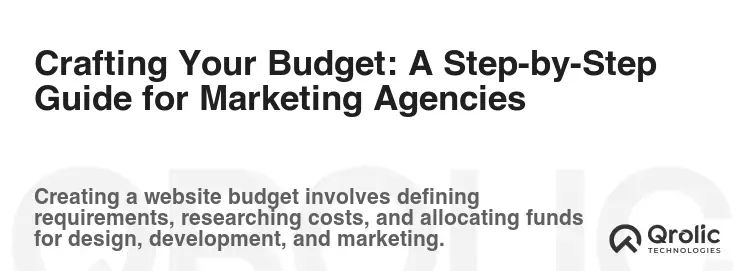
Navigating the landscape of marketing agency website cost can feel overwhelming, but a structured approach to budgeting can demystify the process. By following these steps, you can create a realistic and effective budget that aligns with your agency’s goals and financial capacity.
1. Define Your Goals & Scope: What Do You Want Your Website to Do?
Before you even think about prices, clarify the purpose of your website. This is the most critical step.
- Primary Objective: Is it primarily for lead generation, showcasing a portfolio, recruiting talent, or providing resources?
- Target Audience: Who are you trying to reach? What are their pain points, and how can your website address them?
- Key Performance Indicators (KPIs): How will you measure success? (e.g., number of leads, conversion rate, organic traffic, bounce rate, average time on page).
- Future Vision: Where do you see your agency in 3-5 years? Your website should be able to scale with your ambitions.
Example: “Our primary goal is to generate 20 qualified leads per month through our website by showcasing our advanced SEO case studies and offering free consultations. We also need to attract senior SEO specialists.”
2. Research & Prioritize Features: Must-Haves vs. Nice-to-Haves
With your goals defined, list all potential features and then categorize them ruthlessly.
- Must-Haves (Tier 1): Essential for launching a functional website that meets your primary goals (e.g., responsive design, core service pages, contact forms, portfolio/case study section, basic SEO).
- Should-Haves (Tier 2): Features that significantly enhance user experience or conversion, but could be added in a later phase if the budget is tight (e.g., CRM integration, advanced analytics, live chat, detailed blog).
- Could-Haves (Tier 3): Desirable features that offer an edge but are not critical for the initial launch (e.g., client portal, custom interactive tools, AI personalization, multi-language support).
Practical Tip: Use a spreadsheet. List each feature, assign it a priority, and estimate the effort (low, medium, high) required for implementation. This will help you identify where your marketing agency website cost will be concentrated.
3. Consider Your Audience: What Do They Need/Expect?
Your website isn’t for you; it’s for your prospective clients.
- User Journey: Map out the typical path a potential client will take on your site. What information do they need at each stage?
- Content Types: Do they prefer video, detailed case studies, quick summaries, or interactive elements?
- Design Preferences: Does your audience respond better to minimalist design, bold visuals, or a more traditional aesthetic?
- Accessibility: Ensure your site is usable for everyone, including those with disabilities (WCAG compliance), which can impact design and development choices.
4. Get Multiple Quotes: Compare Apples to Apples
Contact several reputable web development agencies or freelancers.
- Provide a Detailed Brief: Share your defined goals, scope, and prioritized feature list. The more information you provide, the more accurate the quotes will be.
- Ask for Itemized Breakdowns: Request detailed breakdowns of costs for design, development (by feature), content integration, SEO setup, and ongoing maintenance. This helps you understand where the marketing agency website cost is coming from.
- Evaluate Portfolios & References: Look at their previous work, especially for marketing agencies or similar professional services. Speak to their past clients.
- Assess Communication & Process: How responsive are they? Do they have a clear development process? Effective communication is vital for a successful project.
- Don’t Just Pick the Cheapest: The lowest bid often reflects compromises on quality, features, or support. Look for value, expertise, and a partner who understands your agency’s unique needs.
5. Allocate for Ongoing Costs: Maintenance, Content, Marketing
Your initial development budget is only part of the story. Neglecting ongoing costs is a common mistake.
- Hosting & Domain: Budget annually.
- Maintenance Retainer: Plan for monthly or annual fees for updates, security, and minor tweaks.
- Content Marketing: Dedicate a budget for ongoing blog posts, case studies, and other content to keep your site fresh and improve SEO.
- Paid Marketing (Optional): If you plan to drive traffic via PPC or social media, factor that into your overall digital marketing budget.
- Future Enhancements: Set aside a small buffer for unexpected needs or minor feature additions.
6. Think Scalability: Can It Grow With You?
Ensure your chosen platform and architecture can support future growth without requiring a complete rebuild every few years.
- CMS Flexibility: Can you easily add new pages, services, or blog categories?
- Integration Capabilities: Can it connect with new marketing tools (CRMs, automation platforms) as your agency evolves?
- Performance: Will it handle increased traffic without slowing down?
By meticulously working through these steps, you won’t just arrive at a marketing agency website cost; you’ll arrive at an informed investment strategy that maximizes your agency’s digital potential.
Choosing Your Web Development Partner: More Than Just a Price Tag

Selecting the right web development partner is as crucial as defining your marketing agency website cost budget. This decision can be the difference between a thriving online asset and a frustrating, underperforming expense. Look beyond the immediate quote and consider these factors:
-
Expertise and Experience:
- Portfolio: Do they have a strong portfolio, especially projects for marketing agencies or professional service firms? Look for design quality, functionality, and performance.
- Industry Knowledge: Do they understand the unique needs of a marketing agency? Can they speak to lead generation, case study presentation, and showcasing expertise?
- Technical Proficiency: Are they proficient in the technologies you prefer or that are best suited for your goals (e.g., WordPress, Webflow, custom development, headless CMS)?
- SEO Acumen: As a marketing agency, your web developer must understand and implement SEO best practices from the ground up, not just as an afterthought.
-
Communication and Transparency:
- Responsiveness: How quickly do they respond to your initial inquiries? This often indicates their ongoing communication style.
- Clear Process: Do they outline a clear development process, including discovery, design, development, testing, and launch?
- Regular Updates: Will they provide regular updates and involve you in key decision points?
- Honest Feedback: Are they willing to push back or offer alternative, better solutions rather than just agreeing to everything?
- Cost Breakdown: Do they provide a detailed, itemized breakdown of the marketing agency website cost so you know exactly what you’re paying for?
-
Post-Launch Support and Maintenance:
- Ongoing Support Plans: Do they offer maintenance packages for updates, security, and bug fixes? A website is never “done.”
- Training: Will they train your team on how to manage content, make minor updates, and understand analytics?
- Availability: What are their support hours and response times for critical issues?
- Scalability Advice: Can they advise on how your website can grow and evolve with your agency’s future needs?
-
Understanding Your Agency’s Needs:
- Discovery Process: Do they ask insightful questions about your business goals, target audience, competitive landscape, and unique selling propositions?
- Solution-Oriented: Do they propose solutions that genuinely align with your objectives rather than just selling generic packages?
- Partnership Approach: Do they feel like a true partner invested in your success, rather than just a vendor completing a task?
-
Red Flags to Watch Out For:
- Extremely Low Bids: If a quote is significantly lower than others, be wary. It often signals cut corners, hidden fees later, or inexperienced developers.
- Lack of Portfolio/References: If they can’t show you relevant work or connect you with past clients, proceed with caution.
- Guaranteed SEO Rankings: No reputable developer can guarantee specific rankings; it’s a long-term strategy involving many factors.
- Poor Communication: Unresponsive, vague, or overly technical communication during the quoting phase is a bad sign for the project ahead.
- No Contract or Vague Terms: Insist on a clear, detailed contract outlining scope, timelines, deliverables, payment schedules, and ownership of the website.
By carefully vetting potential partners and prioritizing value over just the lowest marketing agency website cost, you’ll secure a relationship that fosters a high-performing website and contributes to your agency’s long-term success.
Qrolic Technologies: Your Partner in Building a High-Impact Marketing Agency Website
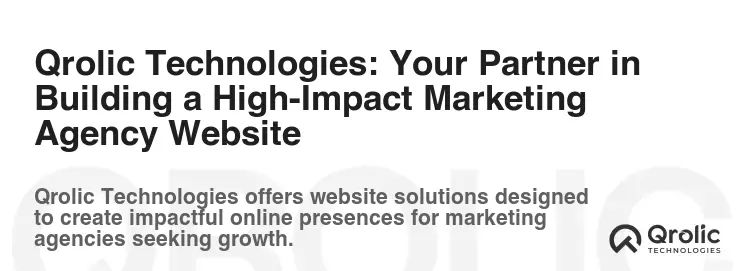
When your marketing agency seeks to make a powerful statement in the digital realm, you need a web development partner who not only understands the intricacies of design and code but also deeply appreciates the unique demands and aspirations of a marketing business. This is where Qrolic Technologies steps in – a seasoned digital agency dedicated to crafting websites that don’t just exist online, but actively drive growth and cement your authority.
At Qrolic Technologies, we recognize that your marketing agency’s website is your most valuable asset. It’s not just a collection of pages; it’s a meticulously engineered ecosystem designed to convert visitors into qualified leads, showcase your exceptional portfolio, and articulate your distinctive brand voice. We understand the precise balance required between stunning aesthetics, flawless functionality, and paramount search engine optimization – because as a marketing agency, your digital presence is your primary case study.
Our approach to tackling the marketing agency website cost is rooted in transparency and strategic value. We believe in building long-term partnerships, not just delivering projects. This means taking the time to truly understand your agency’s specific niche, target clientele, current challenges, and ambitious growth objectives. Our discovery process is thorough, ensuring that every design decision and development choice directly contributes to your desired outcomes.
What sets Qrolic Technologies apart as the ideal partner for your marketing agency website:
- Deep Industry Understanding: We’re not just generalist web developers; we have extensive experience working with marketing agencies. We grasp the importance of dynamic case study presentations, integrated CRM systems for lead nurturing, sophisticated analytics setup, and the critical role of thought leadership content. We understand that your website must be a living example of the marketing excellence you provide to your own clients.
- Custom-Tailored Solutions: While we leverage efficient frameworks where appropriate, our strength lies in crafting bespoke solutions. Whether you need a fully custom design that embodies your unique brand identity, or advanced functionalities like client portals, interactive calculators, or complex multi-channel integrations, Qrolic Technologies has the expertise to bring your vision to life. Your website won’t just look good; it will perform precisely how your agency needs it to.
- SEO-First Development: For a marketing agency, a beautiful website is only half the battle; it must also be discoverable. Our developers and SEO specialists work hand-in-hand from the project’s inception. We ensure that your website is built with an SEO-friendly architecture, blazing-fast loading speeds, clean code, proper schema markup, and mobile responsiveness – all crucial elements that search engines value, giving your agency a powerful head start in organic rankings.
- Uncompromising UI/UX Design: We believe that exceptional user experience drives conversions. Our design team focuses on intuitive navigation, compelling calls-to-action, and visually engaging layouts that captivate your audience and guide them seamlessly through your services and portfolio. We design for impact, ensuring every click is a step closer to conversion.
- Scalability and Future-Proofing: The digital landscape is always evolving. Qrolic Technologies builds websites with scalability in mind, using robust technologies and modular architectures that allow for easy expansion, feature additions, and adaptation to future trends without the need for costly complete overhauls. Your investment today will serve you well into 2026 and beyond.
- Transparent Budgeting & Project Management: We provide detailed proposals that clearly outline the marketing agency website cost by component, ensuring you have a complete understanding of your investment. Our project management is agile and communicative, keeping you informed at every stage, from wireframing to launch and beyond.
At Qrolic Technologies, your marketing agency’s success is our success. We’re more than just developers; we’re strategic partners dedicated to building a digital platform that amplifies your agency’s expertise, attracts your ideal clients, and positions you as an undeniable leader in the marketing industry.
Ready to transform your online presence into a powerhouse of lead generation and brand authority? Explore our expertise and discover how Qrolic Technologies can elevate your marketing agency’s website. Visit us at https://qrolic.com/ for a comprehensive consultation that addresses your specific marketing agency website cost considerations and strategic goals. Let’s build something extraordinary together.
Future-Proofing Your Investment: Trends for Marketing Agency Websites in 2026
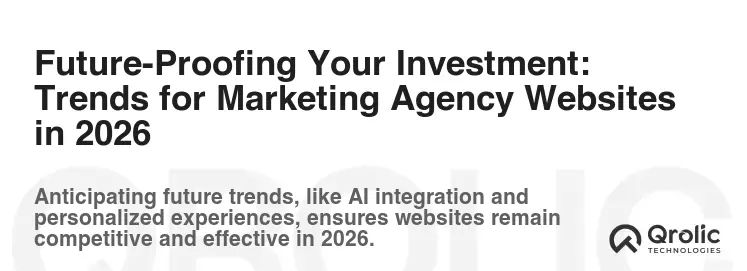
Investing in a new website for your marketing agency in 2026 means looking beyond current best practices and anticipating future trends. Future-proofing your marketing agency website cost ensures that your digital asset remains relevant, effective, and competitive for years to come. Here are key trends to integrate:
1. AI Integration and Personalization
Artificial intelligence will move beyond simple chatbots to create truly personalized user experiences.
- AI-Powered Content Recommendations: Websites will leverage AI to analyze user behavior and recommend relevant case studies, blog posts, or service offerings.
- Dynamic Content: Content elements that change based on the visitor’s industry, location, or previous interactions.
- Advanced Chatbots: More sophisticated AI chatbots capable of answering complex questions, qualifying leads more effectively, and even scheduling meetings with a higher degree of natural language understanding.
2. Voice Search Optimization
As voice assistants become ubiquitous, optimizing your content for conversational queries will be crucial.
- Natural Language Keywords: Shifting from short, abrupt keywords to longer, more natural-sounding questions and phrases.
- Featured Snippets: Structuring content to answer specific questions directly, increasing the chances of appearing in voice search results (often pulled from featured snippets).
- Local SEO for Voice: Optimizing for “near me” searches, essential for agencies targeting local clients.
3. Core Web Vitals & Hyper-Performance
Google’s Core Web Vitals (Largest Contentful Paint, First Input Delay, Cumulative Layout Shift) are already critical ranking factors and will only become more important.
- Lightning-Fast Loading Speeds: Aggressive optimization of images, code, and server responses to ensure near-instantaneous page loads.
- Seamless Interactivity: Ensuring the site responds immediately to user input without frustrating delays.
- Visual Stability: Eliminating unexpected layout shifts that annoy users and disrupt their experience.
4. Interactive Content and Engagement
Static websites will struggle to capture attention. Interactive elements foster deeper engagement.
- Quizzes & Assessments: Tools to help potential clients self-assess their marketing needs or discover which of your services best fits them.
- Interactive Case Studies: Dynamic presentations of your work, allowing users to explore different data points or outcomes.
- Animated Explainer Videos & Infographics: Engaging multimedia content that conveys complex information quickly and effectively.
- 3D Elements & Virtual Tours: For showcasing office space, team culture, or even conceptual marketing campaigns.
5. Prioritizing Accessibility (WCAG Compliance)
Making your website accessible to users with disabilities isn’t just about compliance; it’s about inclusivity and expanding your potential audience.
- Robust Navigation: Keyboard-only navigation, clear focus indicators.
- Semantic HTML: Properly structured code for screen readers.
- Alt Text for Images: Descriptive text for visual content.
- Color Contrast: Ensuring readability for all users.
- Transcripts for Audio/Video: Providing alternative formats for multimedia content.
6. Headless CMS Advantages
For agencies requiring ultimate flexibility, performance, and multi-channel content delivery, a headless CMS will become increasingly prominent.
- Content Everywhere: Delivering content seamlessly to your website, mobile apps, social media, smart devices, and future platforms from a single source.
- Enhanced Security: Decoupling the frontend from the backend can reduce attack vectors.
- Developer Freedom: Allowing developers to use their preferred frontend frameworks, leading to highly optimized and custom user experiences.
7. Sustainable Web Design
As environmental concerns grow, agencies will look to minimize the carbon footprint of their websites.
- Lean Coding: Efficient code that requires less energy to load and run.
- Optimized Hosting: Choosing green hosting providers powered by renewable energy.
- Efficient Media: Using optimized images and videos to reduce data transfer.
By integrating these forward-looking trends into your marketing agency website cost budgeting and development plan, you’re not just building a website for today; you’re creating a dynamic, adaptable, and highly effective digital asset ready to conquer the challenges and opportunities of 2026 and beyond.
The Final Verdict: Your Marketing Agency Website is an Investment, Not an Expense
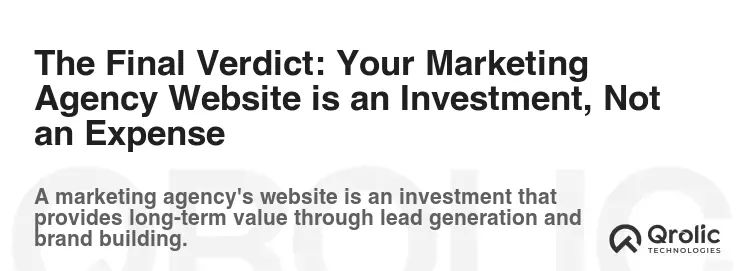
As we’ve meticulously explored the multifaceted landscape of marketing agency website cost, one truth becomes undeniably clear: a high-quality, strategically developed website for your marketing agency is not an expense to be minimized, but a critical investment to be maximized. In the competitive digital arena of 2026, your website stands as the single most powerful manifestation of your brand, your expertise, and your potential to deliver results for your clients.
Think of it this way: for a marketing agency, your website is your most prominent piece of marketing. It’s the proof in the pudding, the testament to your own capabilities. Would you advise your clients to cut corners on their most visible marketing asset? Absolutely not. You wouldn’t compromise on the quality of their campaigns, their branding, or their lead generation strategies. Your own agency’s website deserves the same level of strategic thought, meticulous planning, and appropriate financial commitment.
The value derived from a website that consistently generates qualified leads, elevates your brand’s authority, showcases your portfolio with compelling case studies, and provides a seamless user experience far transcends its initial development cost. It empowers your sales team, attracts top talent, and establishes an enduring foundation for sustainable growth. The “hidden costs” of an underperforming or outdated website—lost opportunities, damaged credibility, and a constant struggle for visibility—will invariably prove far more detrimental to your bottom line than a well-planned investment.
By understanding the components that influence the marketing agency website cost, diligently crafting a budget that aligns with your agency’s unique goals, and partnering with an expert like Qrolic Technologies who understands the nuances of your industry, you can transform your online presence from a mere digital brochure into a powerful, revenue-generating engine.
In 2026, the agencies that thrive will be those that embrace their website as a dynamic, evolving strategic asset. It’s time to build a digital home that truly reflects the innovation, expertise, and success your marketing agency brings to the world. Invest wisely, build strategically, and watch your agency soar.

